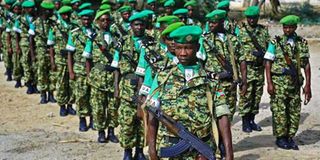AU to withdraw 1,000 troops from Somalia this year

Amisom soldiers in Somalia. The AU's mission in Somalia has said it will withdraw 1,000 troops fighting jihadists in the country this year. PHOTO | MOHAMED ABDIWAHAB | AFP
What you need to know:
- Amisom troops deployed to Somalia in 2007 to defend the internationally-backed government against attacks by Al-Shabaab.
- Al-Shabaab is an Al-Qaeda affiliate still carrying out attacks on civilian, military and government targets in Mogadishu and elsewhere.
- Currently the bloated and largely ineffective Somali army is more a collection of clan militias.
NAIROBI
The African Union's mission in Somalia has said it will withdraw 1,000 troops fighting jihadists in the country this year, as part of plans to pull out all soldiers by December 2020.
In a statement released Tuesday, the AU's special representative for Somalia Francisco Madeira called for urgent support to enable the national army to take over responsibility for the country's security.
"Troop movements have started in different parts of the country and will continue for the coming weeks," Madeira said.
"This is a process of realignment to effect the reduction in numbers and also begin the handover process of national security responsibility to the Somali National Security Forces."
FIGHT SHABAAB
African Union Mission in Somalia (Amisom) troops deployed to Somalia in 2007 to defend the internationally-backed government against attacks by the Shabaab, an Al-Qaeda affiliate still carrying out attacks on civilian, military and government targets in the capital Mogadishu and elsewhere.
In 2016 the African Union announced an exit strategy which would see some 22,000 troops withdraw and hand over control of security to the national army.
CLAN MILITIAS
Currently the bloated and largely ineffective Somali army is more a collection of clan militias, with various international militaries providing poorly-coordinated training to different units.
"The forces urgently need to be equipped with necessary weapons, key logistical support including timely payment of stipends, provision of quality medical care, establishment of key infrastructure including barracks and training centres among others," said Madeira.
He said that the drawdown would be gradual and would ensure the security of the country is not disrupted.
LOST FOOTHOLD
The Shabaab lost its foothold in Mogadishu in 2011, but has continued its fight, and was blamed for the country's worst ever attack in which a truck bombing left 358 dead in the capital last month.
Two weeks later an attack on a hotel left 27 dead, prompting the government to sack its police and intelligence chiefs.
Shortly before his dismissal, intelligence agency boss Abdillahi Mohamed Sanbalooshe wrote an op-ed in the New York Times criticising international partners for not responding to Somali requests for technical and training expertise to analyse forensic evidence after attacks like the October 14 bombing.





